Dutch people went to polls on Wednesday in elections that will test nationalist sentiment that has been highlighted by a dispute with Turkey that has simmered in recent days.
The elections are the first of three this year in the European Union where anti-immigrant parties are seeking breakthroughs.
The center-right VVD party of Prime Minister Mark Rutte, 50, is vying with the PVV (Party for Freedom) of anti-Islam and anti-EU firebrand Geert Wilders, 53, to form the biggest party in parliament.
As many as 13 million voters began casting ballots at polling stations across the country that will close at 9:00 p.m.
“I am voting for Wilders. I hope he can make a change to make the Netherlands better,” said Wendy de Graaf, who was dropping her children off at school in The Hague. “I don’t agree with everything he says…but I feel that immigration is a problem.”
Wilders, who has vowed to “de-Islamicize” the Netherlands, has virtually no chance of forming a government given that all the leading parties have ruled out working with him, but a PVV win would still send shockwave across Europe.
The vote is the first gauge of anti-establishment sentiment in the European Union and the bloc’s chances of survival after the surprise victory of EU-skeptic Donald Trump in the United States and Britain’s 2016 vote to exit the union.
France chooses its next president, with far-right Marine Le Pen set to make the second-round run-off in May, while in September right-wing euroskeptic party Alternative for Germany, which has attacked Chancellor Angela Merkel’s open-door refugee policy, will probably win its first lower house seats.
In the Netherlands, late opinion polls indicated a three percentage point lead for Rutte’s party over Wilders’, although these did not fully take into account a rupture of diplomatic relations with Ankara after the Dutch banned Turkish ministers from addressing rallies of overseas Turks.
Turkish President Recep Tayyip Erdogan accused the Dutch of behaving like Nazis. Early indications are that the dispute may have helped both.
In a final debate Tuesday night, Wilders clashed with Lodewijk Asscher, whose Labor party stands to lose two-thirds of its seats in its worst defeat ever on current polling. Asscher defended the rights of law-abiding Muslims to not be treated as second-class citizens or insulted for wearing headscarves.
“The Netherlands belongs to all of us, everyone who does their best” Asscher told Wilders, to applause from onlookers. Wilders shot back that Labor policies permitting immigration had cost the country “buckets of money”, with high rates of unemployment and criminality among immigrants.
Wilders voted in a primary school in The Hague, mobbed by television cameras, just after final opinion polls showed he was slipping behind Rutte.
“Whatever the outcome of the election today the genie will not go back into the bottle. And this patriotic revolution, whether today or tomorrow, will stay,” Wilders said.
“I see this rightwing populist making gains and I will not live in such a world,” said Esther Zand, 52, who voted in the same school for Labor and against Wilders.
“He’s a rather irritating gentleman,” she added.
While traditional Labor appears to be sinking this year, the ecologist left-wing GroenLinks and its charismatic young leader Jesse Klaver could win 16 to 18 seats.
“I hope GroenLinks will win. Jesse Klaver is a breath of fresh air. To me the current cabinet has not done enough for the environment,” said lawyer Marloes van Heugten.
Unlike the US or French presidential elections, there will be no outright Dutch winner, with up to 15 parties having a realistic chance of winning a seat in parliament and none set to gain even 20 percent of the vote.
Experts predict a coalition-building process that will take months once the final tally is known.
